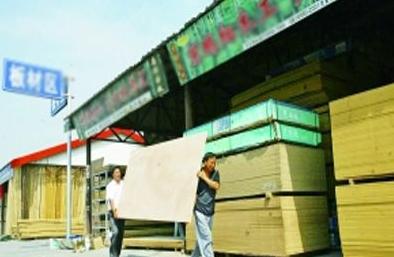 As environmental awareness grows, so do the requirements for eco-friendly materials in home improvement. However, in today’s market, consumers are often confused by various labels such as E1, E0, F4 Star, and CARB certification. What do these terms really mean, and which is the most environmentally friendly option? To find out, reporters visited stores and consulted industry experts.
According to GB18580-2001, which governs formaldehyde emissions from artificial wood panels, there are three main categories: medium-density fiberboard (MDF), high-density fiberboard (HDF), chipboard, and oriented strand board (OSB); plywood, decorative veneer plywood, and blockboard; and decorative man-made boards like laminated flooring and bamboo panels. The first two categories are graded as E1 and E2, with E1 suitable for indoor use without additional finishing, while E2 requires treatment before being used indoors. The third category only has an E1 grade.
Some sellers claim their products meet the European E0 standard, which limits formaldehyde emissions to ≤0.5 mg/L. However, according to Song Guangsheng from the China Interior Decoration Association, E0 is not an official standard but rather a marketing term used by some companies to boost sales. In reality, no official institution certifies E0, and it's often just a self-developed label.
Despite this, many companies still promote E0 as a premium eco-friendly option. Yet, legal cases have shown that some businesses have been penalized for falsely advertising E0 compliance. For example, a cabinet manufacturer in Nanjing was ordered to pay 15,000 yuan after failing to provide valid E0 test reports.
Experts point out that the current national standard may not fully address indoor air quality concerns. Wang Zhengri from the Chinese Academy of Forestry explains that while the standard regulates formaldehyde release per unit, it doesn’t account for total indoor exposure. This can lead to cumulative formaldehyde levels exceeding safe limits when large quantities of panels are used.
In response to growing concerns, the National Standardization Management Committee has proposed revising the standard, potentially eliminating the E2 classification and setting a stricter limit of 1.5 mg/L. Meanwhile, new green standards are being developed to align with international certifications like CARB and JAS.
CARB, set by California’s Air Resources Board, is one of the strictest standards globally, requiring rigorous production controls and even affecting importers and retailers. Similarly, Japan’s JAS certification ensures that all organic materials exported to Japan meet high environmental standards. The F4 Star label, considered one of the most stringent, represents the highest level of environmental safety in Japan.
With ongoing efforts to improve standards, the future of the industry looks more sustainable, offering consumers safer and greener options.
As environmental awareness grows, so do the requirements for eco-friendly materials in home improvement. However, in today’s market, consumers are often confused by various labels such as E1, E0, F4 Star, and CARB certification. What do these terms really mean, and which is the most environmentally friendly option? To find out, reporters visited stores and consulted industry experts.
According to GB18580-2001, which governs formaldehyde emissions from artificial wood panels, there are three main categories: medium-density fiberboard (MDF), high-density fiberboard (HDF), chipboard, and oriented strand board (OSB); plywood, decorative veneer plywood, and blockboard; and decorative man-made boards like laminated flooring and bamboo panels. The first two categories are graded as E1 and E2, with E1 suitable for indoor use without additional finishing, while E2 requires treatment before being used indoors. The third category only has an E1 grade.
Some sellers claim their products meet the European E0 standard, which limits formaldehyde emissions to ≤0.5 mg/L. However, according to Song Guangsheng from the China Interior Decoration Association, E0 is not an official standard but rather a marketing term used by some companies to boost sales. In reality, no official institution certifies E0, and it's often just a self-developed label.
Despite this, many companies still promote E0 as a premium eco-friendly option. Yet, legal cases have shown that some businesses have been penalized for falsely advertising E0 compliance. For example, a cabinet manufacturer in Nanjing was ordered to pay 15,000 yuan after failing to provide valid E0 test reports.
Experts point out that the current national standard may not fully address indoor air quality concerns. Wang Zhengri from the Chinese Academy of Forestry explains that while the standard regulates formaldehyde release per unit, it doesn’t account for total indoor exposure. This can lead to cumulative formaldehyde levels exceeding safe limits when large quantities of panels are used.
In response to growing concerns, the National Standardization Management Committee has proposed revising the standard, potentially eliminating the E2 classification and setting a stricter limit of 1.5 mg/L. Meanwhile, new green standards are being developed to align with international certifications like CARB and JAS.
CARB, set by California’s Air Resources Board, is one of the strictest standards globally, requiring rigorous production controls and even affecting importers and retailers. Similarly, Japan’s JAS certification ensures that all organic materials exported to Japan meet high environmental standards. The F4 Star label, considered one of the most stringent, represents the highest level of environmental safety in Japan.
With ongoing efforts to improve standards, the future of the industry looks more sustainable, offering consumers safer and greener options.lsb board is a new generation of environmentally friendly home board, is an innovative technology and environmentally friendly high-energy home board. lsb board is the upgraded version of OSB BOARD, is a solid wood slicing board.
LSB BOARD,LSB PLYWOOD,LSB CHIPBOARD, Osb3 European Pine Plate,12mm Thick European Pine Board
Linyi Lanshan Weipu Rubber Factory , https://www.weipuwood.com